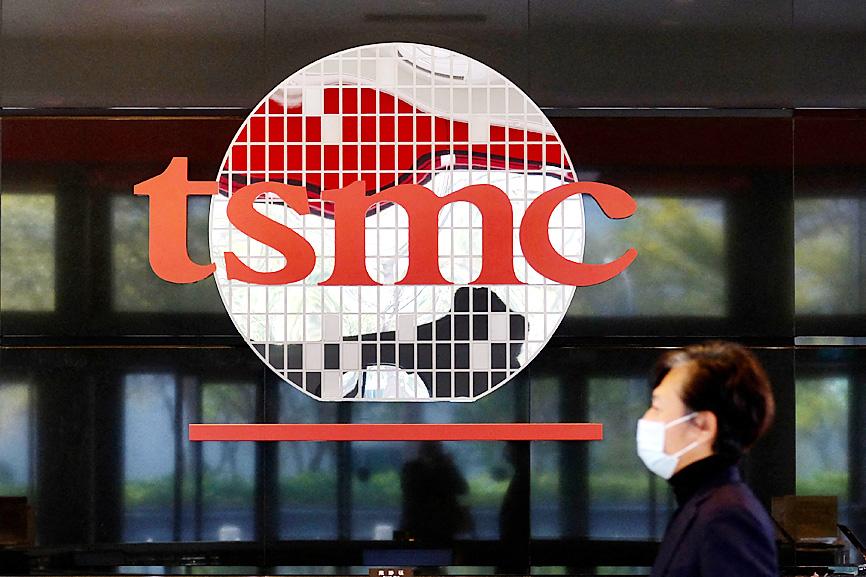Taiwan Semiconductor Manufacturing Co (TSMC, 台積電) plans to invest about US$100 billion to expand capacity and fund research and development (R&D) of advanced technologies in the next three years to keep up with rising demand, it said yesterday.
TSMC unveiled the rare multiyear investment plan to appease customer panic over a global chip shortage.
“We are entering a period of higher growth as the multiyear megatrends of 5G and HPC [high-performance-computing] are expected to fuel strong demand for our semiconductor technologies in the next several years,” TSMC said in a statement.

Photo: Sam Yeh, AFP
In addition, the COVID-19 pandemic has accelerated digitalization, which also drives semiconductor demand, the chipmaker said in the statement.
TSMC made the comments after China-based media Voice reported about the chipmaker’s grand capital investment plan and price adjustments, citing a letter sent by TSMC chief executive officer C. C. Wei (魏哲家) to customers. TSMC declined to comment on pricing.
TSMC has been improving productivity and boosting factory utilization to more than 100 percent over the past 12 months, but has not been able to keep up with demand, Wei said in the letter obtained by the Taipei Times.
The chipmaker is taking more actions to avert future supply crunches, it said.
“TSMC will be building greenfield [new] fabs and expanding existing fabs for both leading-edge and specialty technologies,” Wei said. “We have started hiring thousands of new employees, acquired land and equipment, and started construction of new facilities at multiple sites globally.”
TSMC operates 13 wafer manufacturing factories in Taiwan and China, and is building a new fab in Arizona. Based on the company’s first-phase plan, the US plant would produce 20,000 12-inch wafers per month after it opens in 2024.
TSMC in January budgeted record-high capital expenditure of US$25 billion to US$28 billion for this year, citing technology complexity, technology advancement and high costs of extreme ultraviolet lithography tools.
“Increased capacity will improve supply certainty and help protect complex global supply chains that rely on semiconductors,” Wei said.
In the letter, Wei told customers TSMC would suspend wafer price discounts through the whole of next year, starting on Dec. 31.
“We believe that this modest action is the least disruptive option to supply chains so that TSMC can deliver on our mission of providing leading semiconductor technologies and manufacturing capacity in a sustainable manner,” Wei said.
While most chipmakers have hiked prices by 30 or 40 percent to reflect surging raw material costs and volatile foreign-exchange rates, TSMC has tried to keep prices stable.
Separately, United Microelectronics Corp (UMC, 聯電) yesterday said it would invest more to expand capacity at its factories in Tainan over the next 3 years, in addition to the NT$350 billion (US$12.27 billion) it has spent on capital expenditures over the past decade.
UMC is to spend US$1.5 billion on new facilities and equipment this year, mainly on increasing its 28-nanometer chip capacity, it told investors in January.

CHAOS: Iranians took to the streets playing celebratory music after reports of Khamenei’s death on Saturday, while mourners also gathered in Tehran yesterday Iranian Supreme Leader Ayatollah Ali Khamenei was killed in a major attack on Iran launched by Israel and the US, throwing the future of the Islamic republic into doubt and raising the risk of regional instability. Iranian state television and the state-run IRNA news agency announced the 86-year-old’s death early yesterday. US President Donald Trump said it gave Iranians their “greatest chance” to “take back” their country. The announcements came after a joint US and Israeli aerial bombardment that targeted Iranian military and governmental sites. Trump said the “heavy and pinpoint bombing” would continue through the week or as long

TRUST: The KMT said it respected the US’ timing and considerations, and hoped it would continue to honor its commitments to helping Taiwan bolster its defenses and deterrence US President Donald Trump is delaying a multibillion-dollar arms sale to Taiwan to ensure his visit to Beijing is successful, a New York Times report said. The weapons sales package has stalled in the US Department of State, the report said, citing US officials it did not identify. The White House has told agencies not to push forward ahead of Trump’s meeting with Chinese President Xi Jinping (習近平), it said. The two last month held a phone call to discuss trade and geopolitical flashpoints ahead of the summit. Xi raised the Taiwan issue and urged the US to handle arms sales to

A magnitude 5.6 earthquake struck off the coast of Yilan County at 12:37pm today, with clear shaking felt across much of northern Taiwan. There were no immediate reports of damage. The epicenter of the quake was 16.9km east-southeast of Yilan County Hall offshore at a depth of 66.8km, Central Weather Administration (CWA) data showed. The maximum intensity registered at a 4 in Yilan County’s Nanao Township (南澳) on Taiwan’s seven-tier scale. Other parts of Yilan, as well as certain areas of Hualien County, Taipei, New Taipei City, Taoyuan, Hsinchu County, Taichung and Miaoli County, recorded intensities of 3. Residents of Yilan County and Taipei received

Taiwan has secured another breakthrough in fruit exports, with jujubes, dragon fruit and lychees approved for shipment to the EU, the Ministry of Agriculture said yesterday. The Animal and Plant Health Inspection Agency on Thursday received formal notification of the approval from the EU, the ministry said, adding that the decision was expected to expand Taiwanese fruit producers’ access to high-end European markets. Taiwan exported 126 tonnes of lychees last year, valued at US$1.48 million, with Japan accounting for 102 tonnes. Other export destinations included New Zealand, Hong Kong, the US and Australia, ministry data showed. Jujube exports totaled 103 tonnes, valued at